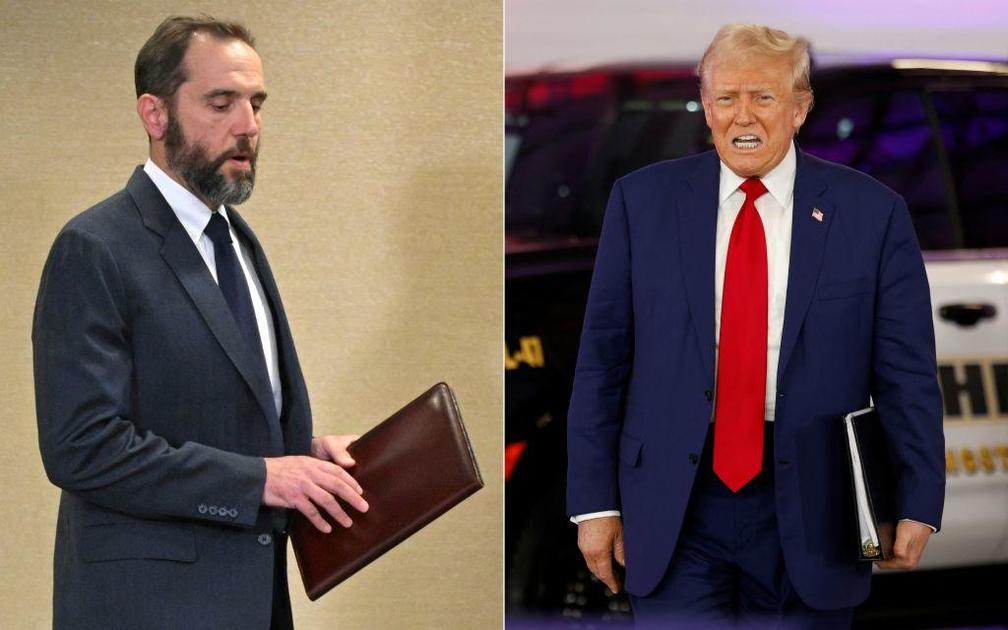In a high-stakes legal battle that has captivated the nation, federal prosecutors and attorneys for former President Donald Trump have presented opposing arguments on how special counsel Jack Smith’s 2020 election-related case against Trump should proceed. Court documents filed late Friday revealed the stark contrast in views between the two parties, setting the stage for a contentious legal battle that could shape the future of American politics.
The crux of the disagreement lies in the interpretation of the Supreme Court’s ruling on presidential immunity, a decision that has far-reaching implications for the case against Trump. Smith, the special counsel appointed to investigate alleged wrongdoing by the former president, has argued that the court should prioritize rulings related to issues of presidential immunity as outlined by the Supreme Court. This would entail a swift resolution of the case, with Smith pushing for expedited proceedings to hold Trump accountable for his alleged actions.
On the other hand, Trump’s legal team has advocated for a more protracted timeline, requesting additional time to review the legal questions at hand. They proposed a schedule that would stretch the case into the spring or fall of 2025, a timeline that would significantly delay any potential resolution. Trump’s lawyers assert that the former president has the right to challenge the new indictment and the underlying grand jury process, signaling their intent to mount a vigorous defense against the charges.
The filing comes in response to U.S. District Court Judge Tanya Chutkan’s call for proposals from both sides on how to proceed following the Supreme Court’s landmark decision granting Trump some degree of presidential immunity from criminal prosecution. The court’s conservative majority ruled that presidents and former presidents are immune from criminal prosecution for official acts taken during their presidency, setting the stage for a complex legal battle over the scope of immunity in Trump’s case.
Chief Justice John Roberts’ opinion explicitly disqualified certain conduct alleged in Smith’s original indictment, such as Trump’s interactions with the Justice Department post-2020 election, from the charges. However, other aspects of the alleged misconduct, including interactions with campaign officials and private attorneys, remained fair game for prosecution. This nuanced distinction has created a legal quagmire that Chutkan must navigate as she determines how to apply the Supreme Court’s ruling to the charges against Trump.
Before Chutkan could weigh in on the matter, Smith secured a superseding indictment against Trump, removing the conduct deemed immune by the Supreme Court and focusing on a refined set of allegedly criminal acts. The new indictment maintains the core allegations of a plot to subvert the 2020 election results, with Trump pleading not guilty to the charges and vehemently denying any wrongdoing. Prosecutors emphasized that the new indictment reflects their efforts to comply with the Supreme Court’s directives, while Trump’s legal team vowed to challenge the validity of the charges on legal grounds.
In a bold move, Trump’s lawyers signaled their intention to file additional motions to dismiss the new indictment, citing claims of immunity from prosecution on specific aspects of the alleged conduct. They highlighted Trump’s interactions with Vice President Mike Pence as a key point of contention, arguing that the special counsel’s inability to rebut the presumption of immunity in this regard should render the case moot. However, prosecutors are expected to counter these claims by asserting that the superseding indictment aligns with the Supreme Court’s ruling and does not confer any additional immunity on Trump.
As the legal battle intensifies, both sides are gearing up for a protracted fight that could shape the trajectory of Trump’s future legal woes. The former president’s legal team has indicated their intent to challenge the legality of Smith’s appointment and funding, a strategy reminiscent of their successful defense in a previous federal case overseen by U.S. District Judge Aileen Cannon. Cannon ruled in Trump’s favor, declaring the special counsel’s appointment invalid, a decision that Smith has vigorously contested in appeals court.
In a bid to keep the proceedings moving forward, prosecutors have proposed a schedule that would allow Chutkan to consider various legal issues simultaneously, setting the stage for a comprehensive examination of the case against Trump. With a hearing scheduled for September in Washington, D.C., the legal showdown between Trump and the special counsel is set to reach a fever pitch, with far-reaching implications for the future of American politics.
In conclusion, the legal battle between former President Donald Trump and special counsel Jack Smith over the 2020 election-related case is poised to shape the course of American politics for years to come. As the two sides present their arguments and jockey for position in the courtroom, the outcome of this high-stakes legal drama remains uncertain. With the Supreme Court’s ruling on presidential immunity looming large over the proceedings, the fate of Trump’s legal troubles hangs in the balance, with the potential to reshape the landscape of American governance and accountability.









